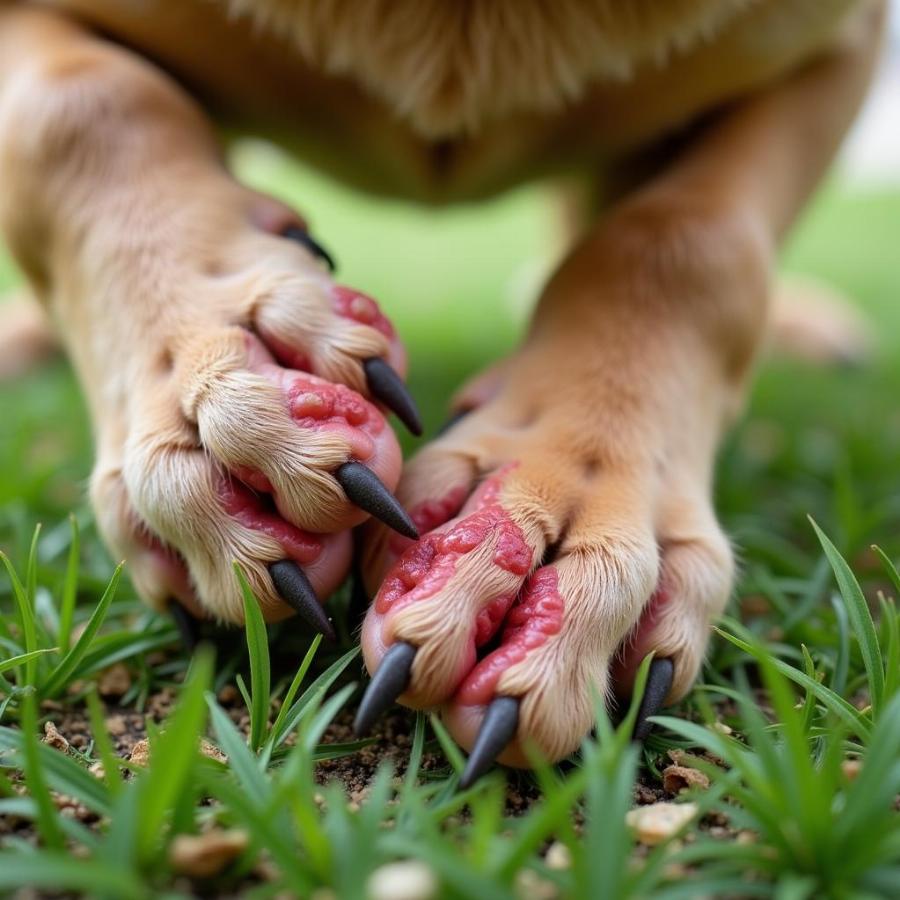Dog itching paws is a common problem that can range from a mild annoyance to a serious medical condition. Understanding why your furry friend is constantly gnawing, licking, or chewing at their paws is the first step to providing relief and preventing further issues. This comprehensive guide will explore the various causes of dog itching paws, offer effective treatment options, and provide practical tips for prevention.
Why Are My Dog’s Paws So Itchy?
Several factors can contribute to itchy paws in dogs. These range from environmental irritants to underlying allergies and infections. Identifying the root cause is crucial for effective treatment. Is it allergies, parasites, or something else entirely? Let’s delve deeper into the potential culprits.
Environmental Irritants
Just like us, dogs can be sensitive to certain substances in their environment. Common irritants include grass, pollen, dust mites, mold, and even cleaning products. These irritants can trigger an allergic reaction, leading to inflammation and itching.
Allergies
Allergies are a frequent cause of dog itching paws. Dogs can be allergic to various things, including food ingredients (like beef, chicken, or dairy), environmental allergens (like pollen, dust mites, and mold), and flea bites. Food allergies often manifest as itchy paws, ears, and skin, while environmental allergies can cause seasonal itching.
Parasites
Fleas, ticks, and mites can all cause intense itching in dogs. Flea allergy dermatitis, a reaction to flea saliva, is a common culprit behind itchy paws. Even a single flea bite can trigger a severe reaction in sensitive dogs.
Infections
Bacterial and yeast infections can also cause itchy paws. These infections can thrive in the warm, moist environment between a dog’s paw pads, leading to redness, swelling, and discomfort.
 Dog itching paws due to environmental irritants
Dog itching paws due to environmental irritants
How to Treat Itchy Paws in Dogs
The treatment for itchy paws depends on the underlying cause. It’s essential to consult with a veterinarian for an accurate diagnosis and appropriate treatment plan.
Home Remedies
For mild cases of itching caused by irritants, you can try some home remedies. Soaking your dog’s paws in lukewarm water with Epsom salts can help soothe irritated skin and reduce inflammation. You can also try applying a paw balm or cream containing natural ingredients like oatmeal or aloe vera.
Medications
Your veterinarian may prescribe medications to address the underlying cause of the itching. Antihistamines can help relieve allergy symptoms, while antibiotics or antifungals may be necessary to treat infections. For severe allergies, your vet may recommend immunotherapy.
Flea and Tick Prevention
Preventing flea and tick infestations is crucial for managing itchy paws. Regularly use a veterinarian-recommended flea and tick preventative to keep these pests at bay.
Preventing Dog Itching Paws
While not all causes of itchy paws are preventable, you can take steps to minimize your dog’s risk.
Regular Paw Cleaning
Regularly cleaning your dog’s paws after walks can help remove irritants like pollen, grass, and dirt. Use a damp cloth or a paw cleaner specifically designed for dogs. If your dog enjoys swimming, consider dog boots.
Healthy Diet
Feeding your dog a balanced and nutritious diet can support their overall health and immune system, making them less susceptible to allergies and infections. Consult your veterinarian to dogs foot swollen for a proper diagnosis and treatment plan.
Environmental Control
Minimizing exposure to potential allergens can also help prevent itchy paws. Regularly vacuum and dust your home, and wash your dog’s bedding frequently. You might consider purchasing an air purifier to reduce airborne allergens. This can also help if you notice your dog exhibiting other behaviors like why does my dog claw at the carpet.
Conclusion
Dog itching paws can be a frustrating problem for both dogs and their owners. By understanding the various causes, treatments, and preventative measures, you can help your furry friend find relief and enjoy a healthier, happier life. Remember to consult with your veterinarian for an accurate diagnosis and personalized treatment plan. Early intervention is key to preventing complications and ensuring your dog’s pawsitive well-being. Don’t let itchy paws keep your dog down!
FAQ
-
What are the signs of itchy paws in dogs? Excessive licking, chewing, biting, redness, swelling, and hair loss around the paws.
-
Can dog itching paws be a sign of something serious? Yes, it can be a symptom of allergies, infections, or parasites.
-
How can I tell if my dog has a paw infection? Look for redness, swelling, discharge, and a foul odor.
-
Is it okay to use human antihistamines on my dog? No, never give your dog human medication without consulting a veterinarian.
-
How often should I clean my dog’s paws? Daily, especially after walks in areas with potential irritants. You can also explore the topic of dog constantly licking paw for more insight.
-
Can changing my dog’s diet help with itchy paws? Yes, a balanced diet can support their immune system and reduce allergy symptoms. Consider products like petsmart dog pads for easy clean-up.
-
What if my dog’s itchy paws don’t improve with home remedies? Consult your veterinarian for a proper diagnosis and treatment. It could be related to something like a dog collar ring causing irritation.
Other Related Questions
- How can I soothe my dog’s itchy paws naturally?
- Are there any specific breeds prone to itchy paws?
- Can stress cause itchy paws in dogs?
Beaut Dogs is your go-to resource for all things related to show dogs, providing reliable, helpful, and in-depth information about the canine world. From breed characteristics to health and grooming tips, we’ve got you covered. When you need assistance, please email us at [email protected] for detailed and accurate answers from Beaut Dogs. Visit https://beautdogs.com today to explore the wonderful world of show dogs and learn how to care for them best!